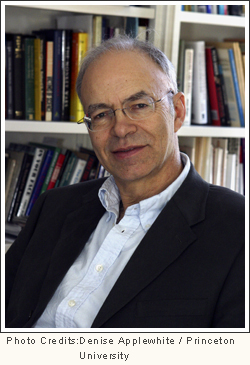 Peter Singer is a philosopher and author, best known for his work in ethics, and often described as the world's most influential living philosopher. In 2005 Time magazine named him one of the 100 most influential people in the world. He is known especially for his work on the ethics of our treatment of animals, and the obligations of the affluent to aid those living in extreme poverty. Peter Singer is a philosopher and author, best known for his work in ethics, and often described as the world's most influential living philosopher. In 2005 Time magazine named him one of the 100 most influential people in the world. He is known especially for his work on the ethics of our treatment of animals, and the obligations of the affluent to aid those living in extreme poverty.
Peter Singer first became well-known internationally after the publication of Animal Liberation in 1975. In 2011 Time included Animal Liberation on its "All-TIME" list of the 100 best nonfiction books published in English since the magazine began, in 1923. Singer has written, co-authored, edited or co-edited more than 40 other books, including Practical Ethics; The Expanding Circle; How Are We to Live?, Rethinking Life and Death, The Ethics of What We Eat (with Jim Mason) and most recently, The Life You Can Save. His works have appeared in more than 20 languages.
Peter Singer was born in Melbourne, Australia, in 1946, and educated at the University of Melbourne and the University of Oxford. He has taught at the University of Oxford and at universities in the United States and Australia. Since 1999 he has been Ira W. DeCamp Professor of Bioethics in the University Center for Human Values at Princeton University, a position that he has, since 2005, combined with the part-time position of Laureate Professor at the University of Melbourne, in the School of Historical and Philosophical Studies. He is married, with three daughters and three grandchildren. In 2012 he was made a Companion of the Order of Australia, the nation's highest civic honour. |

